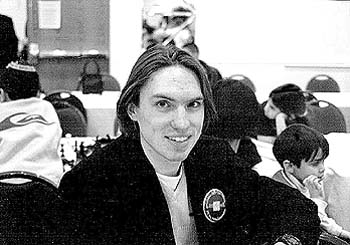Princeton Weekly Bulletin April 5, 1999
Coach leads chess players to victory
By Sally Freedman
|
|
|
|
Macauley Peterson at Littlebrook
|
The event drew 700 students in grades K through 12 to the Double-Tree Hotel in Somerset on March 6 and 7.
Sophomore Macauley Peterson has been coaching Littlebrook's after-school chess program since he came to Princeton last year. With his encouragement, the program has expanded to more than 50 students, and he now has two assistant coaches, Daniel Erlikhman '99 and David Sullivan '01.
In addition to showing up each Friday during the eight-week after-school program, Peterson keeps in touch with his students (and they keep in touch with him) through a Web site he developed for teaching, at http://coach.macauley.com/. It includes everything from photos from past tournaments to personal home pages for each of his private students.
Chess on the Net
Like practially everything else these days, chess is big on the Internet. Active in the Internet Chess Club, Peterson encourages his elementary students to play there. In fact, he cites the ICC as "one of the factors in our tournament success." On the Net, he says, "You play real people, and there are always people--lots of people--who want to play." He feels it's "much more engaging" than playing a computer program, which for most people "is either so simple it's a waste of time or so complicated the computer kills you."
A chess player since the age of five, Peterson played for his own elementary school, Hunter, in New York City, and he now coaches for them. He has competed four times in the World Open Championships and three in the US Open; in 1966 he was Twelfth Grade Cochampion in the National Scholastic Grade Championships. He still competes, he says, "though not as much as I'd like." He participates in competitions "about once in two months, ususally in New York City," and he plays for the Princeton Chess Club, of which he is president.
Princeton Chess Club
The Chess Club, formally organized last year, plays every Thursday night in Whig Hall. "We usually get 10 to 15 people," Peterson notes, "and we have about 120 on our e-mail list of people who've expressed interest." The club fielded teams that placed second in the Eastern Intercollegiate Championships this past November and third in the US Amateur Team East Championship in February.
The Chess Club, too, is exploring new ways of playing on the Internet. They recently placed second (after the University of Texas, Dallas) in the US Chess Federation's National Collegiate Chess League, playing in a tournament that was "the first USCF-rated event played entirely over the Internet," Peterson says. In such games, he explains, "It's as if you're playing a computer, in that you can't see your opponent, but there's a human on the other end moving the pieces." To avoid eye strain, players can use an actual board and transfer each move to the computer for transmission, but "You're not allowed to analyze on the physical board, and the move transmitted is the only move of record and is final."
In between chess games, Peterson is deciding this semester whether to major in philosophy of science or history of science. And when does he find time for his school work?
"That's a good question," he says.
